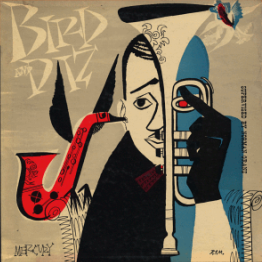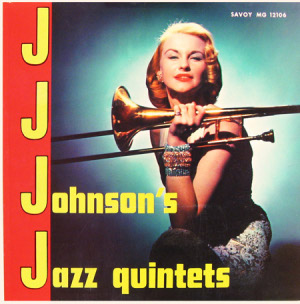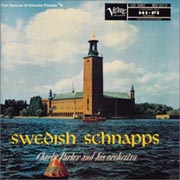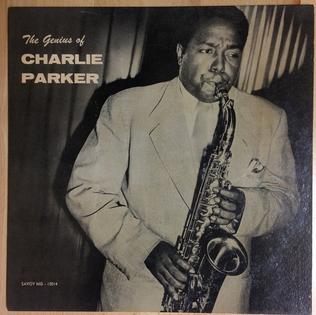
In music, a single is a type of release, typically a song recording of fewer tracks than an LP record or an album. One can be released for sale to the public in a variety of formats. In most cases, a single is a song that is released separately from an album, although it usually also appears on an album. In other cases a recording released as a single may not appear on an album.

An extended play (EP) is a musical recording that contains more tracks than a single but fewer than an album or LP record. Contemporary EPs generally contain four to six tracks and have a playing time of 15 to 22 minutes. There is no strict definition of an "EP", but it is usually less cohesive than an album and more "non-committal".

Theodore "Fats" Navarro was an American jazz trumpet player and a pioneer of the bebop style of jazz improvisation in the 1940s. A native of Key West, Florida, he toured with big bands before achieving fame as a bebop trumpeter in New York. Following a series of studio sessions with leading bebop figures including Tadd Dameron, Bud Powell, and Kenny Clarke, he became ill with tuberculosis and died at the age of 26. Despite the short duration of his career, he had a strong stylistic influence on trumpet players who rose to fame in later decades, including Clifford Brown and Lee Morgan.

Bird and Diz is a studio album by jazz saxophonist Charlie Parker and trumpeter Dizzy Gillespie. It was recorded primarily on June 6, 1950, in New York City. Two tracks featured on the original pressing, "Passport" and "Visa", were recorded by Parker, without Gillespie and with different personnel than the other tracks, in March and May 1949. The album was originally issued in 1952 in 10" format as a collection of 78 rpm singles on the Verve subsidiary label Clef Records.

This is a list of recordings by American jazz alto saxophonist Charlie Parker ("Bird"). Parker primarily recorded for three labels: Savoy, Dial, and Verve. His work with these labels has been chronicled in box sets. Charlie Parker's Savoy and Dial Sessions have been issued on The Complete Savoy Sessions, Charlie Parker on Dial and Complete Charlie Parker on Dial and The Complete Savoy & Dial Master Takes. His Verve recordings are available on Bird: The Complete Charlie Parker on Verve and The Complete Verve Master Takes.

Charlie Parker with Strings is the name of two separate albums by jazz musician Charlie Parker, released in 1950 on Mercury Records. It is also the name of a 1995 compilation album released by Verve Records, containing all the tracks from both the 1950 albums, as well as additional material. The sessions place Parker in the context of a small classical string section and a jazz rhythm section, rather than his standard bebop quintet. They were Parker's most popular sellers during his lifetime, and were admitted to the Grammy Hall of Fame in 1988.
"Yardbird Suite" is a bebop standard composed by jazz saxophonist Charlie Parker in 1946. The title combines Parker's nickname "Yardbird" and a colloquial use of the classical music term "suite". The composition uses an 32-bar AABA form. The "graceful, hip melody, became something of an anthem for beboppers."
"Ko-Ko" is a 1945 bebop recording composed by Charlie Parker. The original recorded version lists Parker on alto saxophone with trumpeter Miles Davis, double bassist Curley Russell and drummer Max Roach. Due to the absence of Bud Powell, Dizzy Gillespie was enlisted to play piano, instead of his usual trumpet. Pianist Sadik Hakim, then known as Argonne Thornton, was also known to be present at the session. Rumors persist to this day about precisely who played trumpet and piano on this piece; some claim it's young Miles Davis who plays trumpet and Gillespie comping at piano, on both takes; most claim Gillespie plays trumpet and, or instead of, piano; some claim Hakim is the pianist on all or part of one or both of the takes. However, Miles Davis confirms in his autobiography that he did not play trumpet on "Ko Ko":
"I remember Bird wanting me to play "Ko-Ko," a tune that was based on the changes of "Cherokee." Now Bird knew I was having trouble playing "Cherokee" back then. So when he said that that was the tune he wanted me to play, I just said no, I wasn't going to do it. That's why Dizzy's playing trumpet on "Ko-Ko," "Warmin' up a Riff," and "Meandering" on Charlie Parker’s Reboppers, because I wasn't going to get out there and embarrass myself. I didn't really think I was ready to play tunes at the tempo of "Cherokee" and I didn't make no bones about it."

J. J. Johnson's Jazz Quintets is a studio album by jazz trombonist J. J. Johnson, released by Savoy Records, containing material from three different recording sessions in 1946, 1947 and 1949. Material from the first two sessions had been previously released on two Savoy EPs, New Trends In Jazz, Vol. 11 and Birth of Bop, Vol. 3. The album was re-issued on CD in 1992, and again in 1994 on the Savoy Jazz label.

The Amazing Bud Powell, Vol. 2 is a studio album by jazz pianist Bud Powell, released on Blue Note Records in 1954, featuring a session Powell recorded with George Duvivier on bass and Art Taylor on drums at the WOR Studios in New York, on August 14, 1953. It was remastered in 2001 by Rudy Van Gelder and reissued as part of Blue Note's RVG Edition series. Prior to this, on all releases bar the first, the album also contained a number of tracks from sessions originally on The Amazing Bud Powell, Vol. 1. The version of the album included on the second disc of The Complete Blue Note and Roost Recordings, a 4 disc box set, is that from the first CD release in 1989.

Swedish Schnapps(The Genius of Charlie Parker, volume 8) is a Charlie Parker studio album, released by Verve Records, compiling recordings made by two different groups, on two different dates in 1951. The tracks had previously been released as 78rpm singles, and the master takes had previously appeared on the 1955 Clef Records LP The Magnificent Charlie Parker.

Young Man with a Horn is the second 10-inch LP studio album by the American jazz musician Miles Davis. Released in March 1953, by Blue Note Records, the album was recorded at the WOR studios in New York City on May 9, 1952.
The following is the discography of American jazz pianist and composer Thelonious Monk (1917–1982).

New Sounds was originally a 10" LP compiling previously released 78 rpm records on the Blue Note label. A CD reissue with the same name and cover appeared in 1991, but while using many of the same personnel, had only two tracks in common with the original LP. It instead compiled a distinct James Moody 10" LP with the Art Blakey tracks and included several tracks previously unreleased on LP or any format. Conversely, the tracks omitted from the CD, which were on the Moody LP, have not been reissued on CD.

The Charlie Parker Story is an LP record by Charlie Parker, released posthumously by Savoy Records. While many of the tracks on this album had been previously released on other formats, this is the first album that chronicles the entire session, recorded November 26, 1945, including all takes of all pieces. This session is famous in that it is the first recorded under Parker's name. It is also controversial, in that to this day it is unclear who the pianist and trumpet player are on all of the tracks.

Charlie Parker Memorial, Vol. 1 is an LP record by Charlie Parker, released posthumously by Savoy Records. Several tracks on this album had been previously released on other formats, but is the first 12-inch release of these master takes. It contains selections from four sessions recorded in 1947 and 1948, and contains several previously unreleased alternate takes from these sessions.

The Immortal Charlie Parker is an LP record by Charlie Parker, released posthumously by Savoy Records. Several tracks on this album had been previously released on other formats, but is the first 12-inch release of these master takes. It contains selections from five sessions recorded between 1944 and 1948, and contains several previously unreleased alternate takes from these sessions.

The Genius of Charlie Parker is an LP record by Charlie Parker, released posthumously by Savoy Records. All but one of tracks on this album had been previously released on other formats, but is the first 12-inch release of these master takes. It contains selections from six sessions recorded between 1944 and 1948, and contains a previously unreleased alternate take from one these sessions.

California Concerts is a live album by saxophonist and bandleader Gerry Mulligan featuring performances recorded at the Stockton High School and Hoover High School in California in late 1954 and released on the Pacific Jazz label. The original LP was the first 12 inch LP to be released on the Pacific Jazz label in 1955. The Gerry Mulligan feature track "Polka Dots and Moonbeams" with Bob Brookmeyer on piano was first released on the compilation LP The Genius of Gerry Mulligan in 1960. Although the tracks were recorded at a high school, recording took place on weekends and in the evening. Chet Baker was originally chosen to be the trumpet player of the session, but was jailed for his ongoing heroin addiction, so trumpeter Jon Eardley took Baker’s place sounding very similar to Baker.
This is the discography of Bud Powell. Most of these recordings are listed by the year they were recorded rather than year released.
















